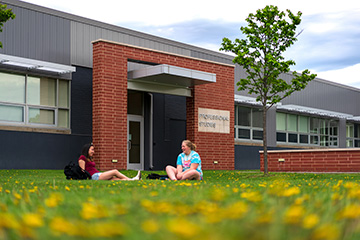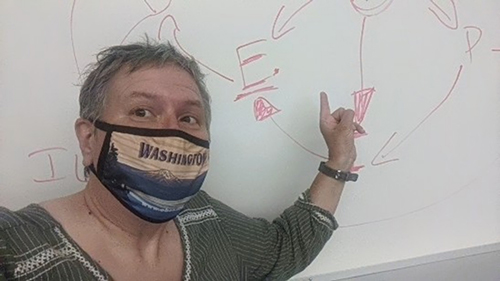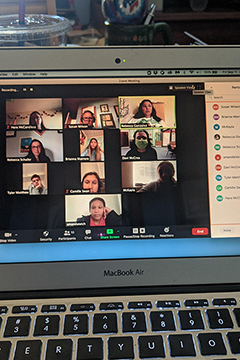
10/13/2020
Many of the students in Susan Wilson’s classes aspire to be recreation therapists. They hope to work in a field that improves lives through leisure activities in settings that can range from hospitals to assisted living facilities.
“I’ve told my students for years: as a recreation therapist, you need to be flexible,” said Wilson, an associate professor of recreation, parks and leisure studies at SUNY Cortland. “Now, because of COVID, I have to model that flexibility as their professor. And I’m trying to do that as best as I can.”
Wilson isn’t alone.
Across the university’s campus, more than 600 faculty members are teaching during an unprecedented semester and navigating challenges created by the COVID-19 pandemic, the latest example being the move to a study-in-place model on Oct. 7.
Prior to that temporary switch, many courses were taught online. Every class relies on technology to help learning. Even the hybrid sections that offered in-person instruction at the start of the semester required revision, with class times shortened in response to a mandate to limit the duration of indoor activities.
 |
| Associate Professor Susan Wilson shares therapeutic recreation course content with students who are learning online. |
Through all of it, SUNY Cortland professors have remained dedicated to their craft in attempt to create meaningful experiences for their students. Wilson’s example kicks off a series of profiles that will be shared over the next several weeks.
She remembers seeing a photo that a friend shared on Facebook in the early months of the pandemic. The image recounted the work of a recreation therapist in a New York City hospital — a worker fully outfitted in personal protective equipment who was using an iPad to connect patients with their families during a lonely and difficult time.
“I told my students: ‘This is what our profession does,’” Wilson said. “And there’s no more important job in the world than connecting people with their families when they’re sick or they’re dying.”
The photo was motivational for Wilson too, reinforcing the ripple effect that her teaching can have in students’ careers as recreation therapists. She’s taught at the college level for 30 years, including 23 at SUNY Cortland, so she embraced the challenge to incorporate more technology in her hybrid classes.
Eventually, her students’ work this semester could improve lives outside of the classroom.
Wilson learned in the spring that the Cortland County Area Agency on Aging needed creative programming solutions for local senior citizens. COVID-19 precautions canceled in-person activities, leaving some people in isolation. The center is a crucial source of social interaction, Wilson said.
The void became an opportunity for students in Wilson’s class devoted to therapeutic recreation interventions. This semester, each student is working on a project that will become an online module — a lesson, game or activity — that can help senior citizens in areas such as reminiscing and sensory stimulation.
“I think everyone is going to come out stronger,” Wilson said. “Students are going to have that virtual programming aspect plus their regular skills.”
 |
| Students in the Recreation, Parks and Leisure Studies Department participate in a play lab held online. |
Each week, the Recreation, Parks and Leisure Studies Department hosts a Friday afternoon session known as play lab, where senior-level students apply classroom lessons and lead mock therapy sessions with other students. The experience has shifted online this semester, with students facilitating activities that span virtual escape rooms to games in a “Family Feud” format. When technology failed during a play lab session earlier in the semester, the lead student was fast to adjust with a new platform.
“It’s kind of thrilling to see them problem-solving and adapting,” said Wilson, praising her students for their diligence and commitment during constantly changing times.
She also passes credit to younger faculty members in the department, including several who pursued their doctoral work online. They have helped older colleagues understand both the instructor and student perspectives in remote learning.
Personal connection is central to Wilson’s work. She said she looks forward to the day when she can experience the regular joys of a semester in person with her students.
“If nothing else, this experience has taught us what’s important,” she said. “Some of the content may not seep through like it would in a traditional classroom, but my students are more empathetic than ever before. That’s a good trade-off for me.”